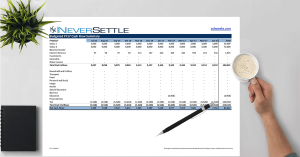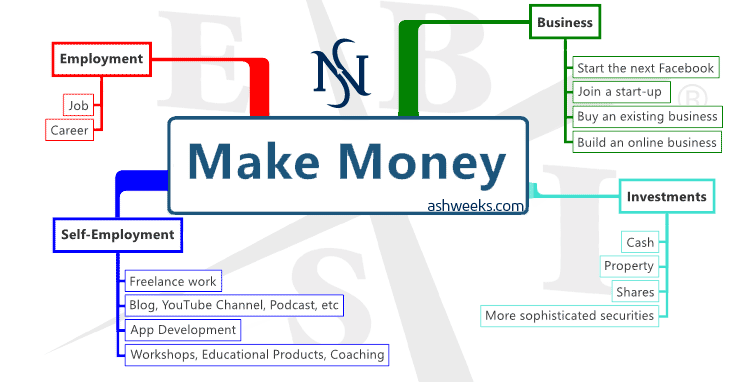We all have limited time and money. As a student, you are probably low on the money side of things, but you do have time which can be traded for money. The three big areas for you to spend these resources on are:
- School
- Work
- Lifestyle
If your balance between work and lifestyle gets out of whack, you’re going to be spending more money than you’re earning and that can easily lead to you turning to debt as a short-term solution. But consumer1 debt can be a horrible source of stress and restriction, so you want to avoid falling into it.
Let’s look at some common ways a student could get into debt and how to avoid this happening to you.
1. Inadequate Financial Planning
A sad truth is that not enough families teach their children about how to manage money properly. Additionally, some students simply can’t predict how their future self will feel if they make certain actions today. This can lead to blissful unawareness during Years 9, 10, and 11, then a crushing blow when reality hits and you realise you want to own a car, pay for schoolies, go to all of the 18th parties and go out with friends more often.
In your biggest year of schooling, you simply don’t have time to work for all of the money required to pay for these purchases. So you get a loan from the bank, your parents, or other family.
Solution
Plan! You don’t need to worry about a full-on budget, just start with the basics:
- How much is your car going to cost in Year 12? $5,000 — $8,000
- Schoolies? $2,000 — $4,000
- 18ths? Maybe 25 x $40: $1,000
- Everything else (phone, food, etc)? Maybe $2,000
- Total: $10,000 — $15,000
Now, how long do you have to save? Like with a lot of things in life, starting early can give a massive boost to your results. If you’re in Year 9 right now, you’ve got about three years to save. That’s about $70 — $100 a week to earn from now until this time in Year 12. Pretty achievable, right? Just a couple of small shifts a week, and anything extra is money to spend or save for the future.
Alternatively, if you leave all of this until Year 12, you’d have to earn $200 — $300 a week for the same result. That’s easily 15 hours a week that you might not be able to give up, depending on your commitment to your studies. But it’s still achievable.
Leaving it to mid-year of Year 12? Nup. You can’t work 30-hour weeks while going to every 18th and performing your best in VCE. Plan.
2. Expensive Ego or Denial
You might only have enough money for a decent Android or an older model iPhone. You might only be able to afford an old Holden Commodore wagon that’s an unsightly green colour. You might only be able to afford a nice range of quality clothes without the fancy brands. Even so, you can’t be seen owning any of those things and, instead of saving or finding a way to earn the money to afford it, you spend all of your money on the latest iPhone, high-end branded clothing, and you borrow money from a bank or family for a sportier, sexier car. That’s your ego talking, and it’s expensive.
My Dad often says, “Buy the cheapest car your ego can afford.”

How expensive is your ego?
It’s not new advice, but it’s good advice. While I had classmates getting a loan for a $15k+ car that accrues interest, I bought the old Holden Commodore for $5k and it’s still running nicely after four years of my ownership. I could have afforded something much nicer, but I’m using those savings to better my financial position through investments and business. Once I’m financially well-off, I’ll be the one in a fancy car but I’ll also be financially stress free. Priorities.
Perhaps you don’t have an expensive ego, though. Perhaps you’re just in denial. Everyone has desires for nicer, bigger, better, and more things. But if you switch off the part of your brain that analyses the other side of equation (how much you can actually afford) then the result is the same as if you had an expensive ego. You’ll get the nice shiny things and ignore your financial situation until you’re in debt.
Solution
Assess your ego.
Do you really need that fancy car? Do you really need the newest iPhone when your current phone is perfectly fine2?
Who are you trying to impress? How do you value yourself? Care less about what other people think and do what’s best for you.
3. Crisis or Hardship
If something happens to you that restricts your available productive time, then you would have to make a hard decision: which area of your life takes a hit? School, work, or lifestyle?
Perhaps it’s severe injury that keeps you in hospital or restricts your mobility; or an illness that keeps you bedridden or lacking energy for days, weeks, or even long-term; or maybe mental instability from a personal attack or depression.
Alternatively, something distressing could happen in your family, such as divorce or a death. These sorts of events indirectly sap your time and energy through their mental presence and the extra household duties that inevitably become your responsibility.
You might have taken a hit in all three areas if you are keeping some sort of balance. School is the most important, and if you simply didn’t have the time to work enough to scrounge up enough coin for an adequate lifestyle, you might turn to debt as a short-term solution.
Solution
Unfortunately, you can’t prevent most of these things from happening to you, short of staying healthy and avoiding highly risky activities. Fortunately, they are rare enough or mild enough that you shouldn’t have to worry too much.
If something like this happens to you, then that sucks. No question about it. But what is the best thing for you to do in your situation? Dwell on the shit things life can throw at you? Or do the best you can with what you have and create the life you want to live?
Once You’re in Debt
Recognising that you’re in debt and you want to get out of it, the next step is to manage that reality and plan a way out of it. See the post on how to get out of debt.
debt used for investments can be useful for leverage and growth. Investment debt is only fine if the asset the debt was used for is producing income. Consumer debt is money borrowed for non-income-producing things ↩
being careless with your current phone in the hope that it breaks, for an excuse to get a new one, is just stupid. Don’t do it. ↩






